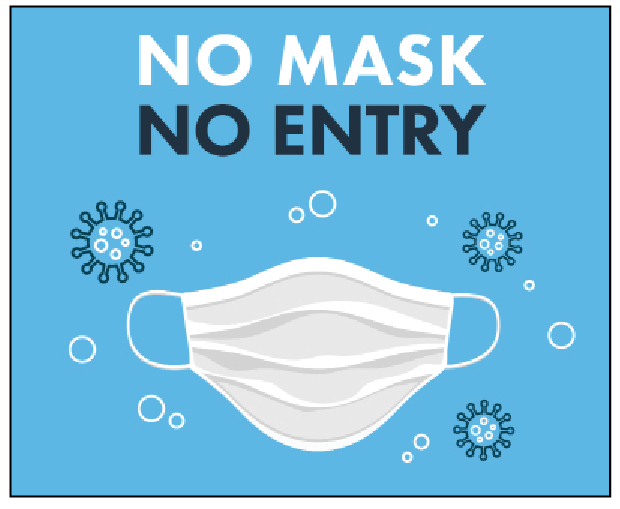In part two of this two-part article on de-escalating situations with guests who don’t comply with COVID-19 mandates, security professionals Charles Wilson and Gary Sikorski of Strategic Club Consultants speak with ED Magazine Legal Correspondent Larry Kaplan on the role of managers, passing off a guest, handling guests who won’t keep masks on, and the importance of partnerships with law enforcement.
(Editor’s note: check out part one on dealing with COVID rage right here!)
ED: What about when nothing works and, try as you may, you can’t de-escalate the guest?
SIKORSKI: In the event the guest becomes hostile, and you’re unable to diffuse it, you must utilize local law enforcement partners. If it gets to a point where they refuse to leave, it’s more than just the mask; they’re becoming disorderly, and it’s trespassing.
 WILSON: With COVID-19, managers must now be more out front with staff and security. Staff and security can’t be out on an island trying to enforce the mandates. The quicker a manager can be readily available to get in and be empathetic and apologetic, reinforcing that it’s a state policy to keep everybody safe, the better the outcome. You just try your best to give guests options to comply, presenting the attitude of ‘Help us, help you.’
WILSON: With COVID-19, managers must now be more out front with staff and security. Staff and security can’t be out on an island trying to enforce the mandates. The quicker a manager can be readily available to get in and be empathetic and apologetic, reinforcing that it’s a state policy to keep everybody safe, the better the outcome. You just try your best to give guests options to comply, presenting the attitude of ‘Help us, help you.’
ED: Can you talk about the importance of a team approach with these de-escalation situations?
WILSON: Sometimes, security or staff has to be smart enough to understand that they’ve reached the end with a guest, and they must tag in someone else. It’s easy for your ego to get in the way of admitting that what you’re doing isn’t working, and it’s someone else’s turn to try.
It gets to a point where you’re arguing with the guest, back and forth, and they don’t want to talk with you anymore. You can’t take it personally; sometimes, it’s just not your day. You have to pass off the guest to someone else and move away from the situation.
I used to lead a casino security team directly. There were a million times when I tried to de-escalate an irate guest, and they just weren’t hearing me. Maybe they didn’t like a bald guy? I don’t know. My security or a host often offered to handle the situations. I didn’t take offense at my team members telling the boss to step away; it is what it is. Sometimes the guest just needs to hear it from somebody different.
SIKORSKI: Winning is not more important than resolving it. Anger and energy bring more of the same. I like using a handball analogy. If you hit a handball against a brick wall, it will come back to you at pretty much the same speed and energy. But if you hit it into a wet curtain, it just drops. You don’t want to be that hard wall and bounce that energy back; you want to absorb and deflect it; be that curtain and just let it drop.

ED: Do the wearing of masks by staff, security, and guests present challenges to reading and projecting non-verbal cues?
SIKORSKI: When staff and security wear masks, they have to work a little harder to convey a welcoming greeting, as the guests can’t see them smile. Although generally, you can tell a genuine smile by the eyes. Accordingly, since you can’t see their facial expressions, it’s critical to watch the guest’s hands and eyes. Look for that stare and their blinking rate. Are they not blinking at all, trying to stare a hole through you? Or rapidly blinking, showing that they’re hyped up, along with some other physical actions?
While the mask can pose a challenge, we’re looking at how they’re acting and what they’re doing, maintaining situational awareness. We’re trying to read the room and the guests as they enter.
ED: How do clubs enforce state laws, and what is their authority?
WILSON: Staff and security must be fully appraised of their state’s mandates and requirements as an entertainment venue. There will be guests who will challenge them on it; they will know precisely what the law is. It’s incumbent on the store to fully understand their requirements and what enforcement authority they have. If the store deviates at all from the executive order, that person will call them out on it.
ED: I’ve heard from numerous clubs in various states requiring full-time masking, that most masking problems occur after the customers are inside—when they aren’t wearing masks properly or take off the mask altogether. How do you approach these issues?
WILSON: Use the same techniques that we suggest using at the door when they arrive. The failure to continue to adhere to the applicable mask policy is the same as violating any of the club’s other rules—any of which would justify either a refusal to sell them anything and ejection from the club.
“Winning is not more important than resolving it. Anger and energy bring more of the same. I like using a handball analogy. If you hit a handball against a brick wall, it will come back to you at pretty much the same speed and energy. But if you hit it into a wet curtain, it just drops. You don’t want to be that hard wall and bounce that energy back; you want to absorb and deflect it; be that curtain and just let it drop.” – Gary Sikorski
ED: What incentives can a club implement for its guests to wear masks?
WILSON: A person arrives and doesn’t want to wear a mask. Perhaps you offer a discount if they’ll comply? Or maybe offer them a branded mask to wear? Management must empower staff with such incentives to use at their discretion. Sometimes you need to give a guest a break or a deal to feel there is a quid pro quo. If they wear a mask, they’re getting something in return.
SIKORSKI: You can’t do it too often, though, or you’re just encouraging people to act out. If you consistently reward bad behavior, you reinforce it. But you want to have the ability to intercede with a carrot once in a while.
ED: How do you respond to a guest who won’t wear a mask, and you end up turning away, who leaves angrily, making threats?
WILSON: Don’t be hesitant to get law enforcement involved in those cases. They’ll take such threats seriously and won’t see you as a lousy club for asking for their help. Adult nightclubs often avoid involving law enforcement, for fear of detrimental calls-for-service on their record. They must leverage law enforcement for serious threats, without hesitation. It’s their only chip and best tactic.
That’s why it’s so important to have a partnership with local law enforcement. It’s like money in the bank. Suppose you’ve already got that positive relationship with law enforcement. In that case, the officers know you’ll only call if it’s a serious situation, and it won’t be an issue. When police feel the only time they come to a club is for some dumb shit and the club won’t cooperate, you can expect problems.
SIKORSKI: It’s much better to have 10 police calls on record, in advance of altercations, than 10 calls for assaults and disorderly customers.
WILSON: The beauty of ACE of Michigan, the adult nightclub trade association which I worked collaboratively with when I was a Detroit Police commander, was that the police knew the club owners and that they would cooperate, and if they responded to calls, they would get a true story of what was going on, likely a verbal confrontation, as opposed to responding to an all-out brawl. In this age of COVID-rage, adult clubs need to develop these same relationships with law enforcement.
Larry Kaplan is the Legal Correspondent for ED Publications. Mr. Kaplan is a business broker in the sale and purchase of adult venues and the Executive Director of the ACE of Michigan adult nightclub state trade association. Contact Larry Kaplan at (313) 815-3311 or e-mail larry@kaplanstoresales.com. Charles Wilson is a former Detroit Police command officer with 20 years of law enforcement and chief of staff experience who now leads a security team of over 400 security professionals at casinos, hotels, sports arenas and in the corporate world. Contact Charles Wilson at chuck@sccconsults.com. Gary Sikorski is a decorated law enforcement professional and trainer with over 30 years of experience and the director of training at Strategic Club Consultants, LLC. Contact Gary Sikorski at (734) 564-2249 or email gary@sccconsults.com.

































